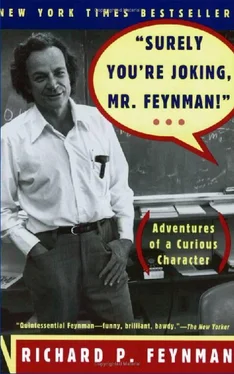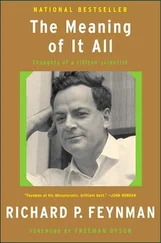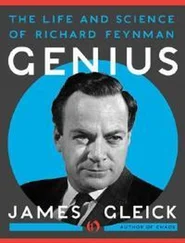People told me that there was a rule in Sweden that after you accept the Prize, you have to back away from the king without turning around. You come down some steps, accept the Prize, and then go back up the steps. So I said to myself, “All right, I’m gonna fix them!”—and I practiced jumping up stairs, backwards, to show how ridiculous their custom was. I was in a terrible mood! That was stupid and silly, of course.
I found out this wasn’t a rule any more; you could turn around when you left the king, and walk like a normal human being, in the direction you were intending to go, with your nose in front.
I was pleased to find that not all the people in Sweden take the royal ceremonies as seriously as you! might think. When you get there, you discover that they’re on your side.
The students had, for example, a special ceremony in which they granted each Nobel-Prize-winner the special “Order of the Frog.” When you get this little frog, you have to make a frog noise.
When I was younger I was anti-culture, but my father had some good books around. One was a book with the old Greek play The Frogs in it, and I glanced at it one time and I saw in there that a frog talks. It was written as “brek, kek, kek.” I thought, “No frog ever made a sound like that; that’s a crazy way to describe it!” so I tried it, and after practicing it awhile, I realized that it’s very accurately what a frog says.
So my chance glance into a book by Aristophanes turned out to be useful, later on: I could make a good frog noise at the students’ ceremony for the Nobel-Prize-winners! And jumping backwards fit right in, too. So I liked that part of it; that ceremony went well.
While I had a lot of fun, I did still have this psychological difficulty all the way through. My greatest problem was the Thank-You speech that you give at the King’s Dinner. When they give you the Prize they give you some nicely bound books about the years before, and they have all the Thank-You speeches written out as if they’re some big deal. So you begin to think it’s of some importance what you say in this ThankYou speech, because it’s going to be published. What I didn’t realize was that hardly anyone was going to listen to it carefully, and nobody was going to read it! I had lost my sense of proportion: I couldn’t just say thank you very much, blah-blah-blah-blah-blah; it would have been so easy to do that, but no, I have to make it honest. And the truth was, I didn’t really want this Prize, so how do I say thank you when I don’t want it?
My wife says I was a nervous wreck, worrying about what I was going to say in the speech, but I finally figured out a way to make a perfectly satisfactory-sounding speech that was nevertheless completely honest. I’m sure those who heard the speech had no idea what this guy had gone through in preparing it.
I started out by saying that I had already received my prize in the pleasure I got in discovering what I did, from the fact that others used my work, and so on. I tried to explain that I had already received everything I expected to get, and the rest was nothing compared to it. I had already received my prize.
But then I said I received, all at once, a big pile of letters—I said it much better in the speech—reminding me of all these people that I knew: letters from childhood friends who jumped up when they read the morning newspaper and cried out, “I know him! He’s that kid we used to play with!” and so on; letters like that, which were very supportive and expressed what I interpreted as a kind of love. For that I thanked them.
The speech went fine, but I was always getting into slight difficulties with royalty. During the King’s Dinner I was sitting next to a princess who had gone to college in the United States. I assumed, incorrectly, that she had the same attitudes as I did. I figured she was just a kid like everybody else. I remarked on how the king and all the royalty had to stand for such a long time, shaking hands with all the guests at the reception before the dinner. “In America,” I said, “we could make this more efficient. We would design a machine to shake hands.”
“Yes, but there wouldn’t be very much of a market for it here,” she said, uneasily. “There’s not that much royalty.”
“On the contrary, there’d be a very big market. At first, only the king would have a machine, and we could give it to him free. Then, of course, other people would want a machine, too. The question now becomes, who will be allowed to have a machine? The prime minister is permitted to buy one; then the president of the senate is allowed to buy one, and then the most important senior deputies. So there’s a very big, expanding market, and pretty soon, you wouldn’t have to go through the reception line to shake hands with the machines; you’d send your machine!”
I also sat next to the lady who was in charge of organizing the dinner. A waitress came by to fill my wine glass, and I said, “No, thank you. I don’t drink.”
The lady said, “No, no. Let her pour the drink.”
“But I don’t drink.”
She said, “It’s all right. Just look. You see, she has two bottles. We know that number eighty-eight doesn’t drink.” (Number eighty-eight was on the back of my chair.) “They look exactly the same, but one has no alcohol.”
“But how do you know?” I exclaimed.
She smiled. “Now watch the king,” she said. “He doesn’t drink either.”
She told me some of the problems they had had this particular year. One of them was, where should the Russian ambassador sit? The problem always is, at dinners like this, who sits nearer to the king. The Prize-winners normally sit closer to the king than the diplomatic corps does. And the order in which the diplomats sit is determined according to the length of time they have been in Sweden. Now at that time, the United States ambassador had been in Sweden longer than the Russian ambassador, But that year, the winner of the Nobel Prize for Literature was Mr. Sholokhov, a Russian, and the Russian ambassador wanted to be Mr. Sholokhov’s translator—and therefore to sit next to him. So the problem was how to let the Russian ambassador sit closer to the king without offending the United States ambassador and the rest of the diplomatic corps.
She said, “You should have seen what a fuss they went through—letters back and forth, telephone calls, and so on—before I ever got permission to have the ambassador sit next to Mr. Sholokhov. It was finally agreed that the ambassador wouldn’t officially represent the embassy of the Soviet Union that evening; rather, he was to be only the translator for Mr. Sholokhov.”
After the dinner we went off into another room, where there were different conversations going on. There was a Princess Somebody of Denmark sitting at a table with a number of people around her, and I saw an empty chair at their table and sat down.
She turned to me and said, “Oh! You’re one of the Nobel-Prize-winners. In what field did you do your work?”
“In physics,” I said.
“Oh. Well, nobody knows anything about that, so I guess we can’t talk about it.”
“On the contrary,” I answered. “It’s because somebody knows something about it that we can’t talk about physics. It’s the things that nobody knows anything about that we can discuss. We can talk about the weather; we can talk about social problems; we can talk about psychology; we can talk about international finance—gold transfers we can’t talk about, because those are understood—so it’s the subject that nobody knows anything about that we can all talk about!”
I don’t know how they do it. There’s a way of forming ice on the surface of the face, and she did it! She turned to talk to somebody else.
Читать дальше












